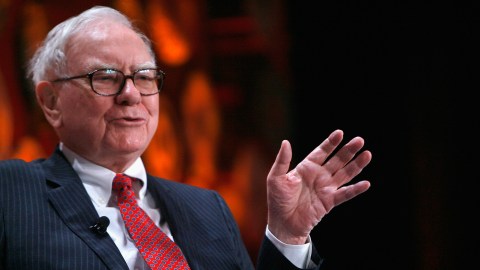How Warren Buffett won a 10-year bet with Wall Street

Every year in late February, investors worldwide look to Warren Buffett’s annual letter to shareholders for investing wisdom and commentary on the state of the market.
This year, the Oracle of Omaha opened his letter with updates on Berkshire Hathaway and federal tax cuts:
On this last point, Buffett explained why high prices prevented him from making major investments in 2017.
“In our search for new stand-alone businesses, the key qualities we seek are durable competitive strengths; able and high-grade management; good returns on the net tangible assets required to operate the business; opportunities for internal growth at attractive returns; and, finally, a sensible purchase price. That last requirement proved a barrier to virtually all deals we reviewed in 2017, as prices for decent, but far from spectacular, businesses hit an all-time high.”

Photo: Paul Morigi/Getty
Last year also marked the end of a 10-year bet that Buffett had with Wall Streets advisors. The purpose of the bet was to see if investment advisors could generally outperform index funds.
To find out, Buffett invested in an unmanaged S&P 500 index fund that he didn’t touch for 10 years. Meanwhile, the investment firm Protégé Partners picked five “funds-of-funds” that it expected to outperform the S&P 500 Index. Buffett wrote:
“Essentially, Protégé, an advisory firm that knew its way around Wall Street, selected five investment experts who, in turn, employed several hundred other investment experts, each managing his or her own hedge fund. This assemblage was an elite crew, loaded with brains, adrenaline and confidence.”
What’s more, the managers of these funds could change their portfolios over the 10 years. But that apparent advantage didn’t matter, because the unmanaged S&P 500 index fund outperformed all five managers.

Wall Street advisors, it seems, can only guarantee one number: their fees.
“Indeed, Wall Street “helpers” earned staggering sums,” Buffett wrote. “While this group prospered, however, many of their investors experienced a lost decade. Performance comes, performance goes. Fees never falter.”
Elsewhere in the letter, Buffett advised investors to use borrowed money to buy stocks.
“When major declines occur, however, they offer extraordinary opportunities to those who are not handicapped by debt. There is simply no telling how far stocks can fall in a short period. Even if your borrowings are small and your positions aren’t immediately threatened by the plunging market, your mind may well become rattled by scary headlines and breathless commentary. And an unsettled mind will not make good decisions.”
To illustrate his point, Buffett quoted British Nobel laureate Rudyard Kipling’s 1895 poem “If–”
“If you can keep your head when all about you are losing theirs . . .
If you can wait and not be tired by waiting . . .
If you can think—and not make thoughts your aim . . .
If you can trust yourself when all men doubt you…
Yours is the Earth and everything that’s in it.”
Buffett also scoffed at the belief that bonds represent a safer investment than equities over the long-term.
“I want to quickly acknowledge that in any upcoming day, week or even year, stocks will be riskier—far riskier—than short-term U.S. bonds. As an investor’s investment horizon lengthens, however, a diversified portfolio of U.S. equities becomes progressively less risky than bonds, assuming that the stocks are purchased at a sensible multiple of earnings relative to then-prevailing interest rates. It is a terrible mistake for investors with long-term horizons—among them, pension funds, college endowments and savings-minded individuals—to measure their investment ‘risk’ by their portfolio’s ratio of bonds to stocks. Often, high-grade bonds in an investment portfolio increase its risk.”
The 87-year-old investor concluded his annual letter with plans for his succession.
“I’ve saved the best for last. Early in 2018, Berkshire’s board elected Ajit Jain and Greg Abel as directors of Berkshire and also designated each as Vice Chairman. Ajit is now responsible for insurance operations, and Greg oversees the rest of our businesses. Charlie and I will focus on investments and capital allocation. You and I are lucky to have Ajit and Greg working for us. Each has been with Berkshire for decades, and Berkshire’s blood flows through their veins. The character of each man matches his talents. And that says it all.”




